Buoyed by this month's election results and jazzed by the prospects for change with a new administration in Washington, some 450 student activists converged on the University of Maryland campus in College Park last weekend to celebrate the 10th anniversary of Students for Sensible Drug Policy (SSDP) at the group's annual international conference.

For both SSDP veterans and newcomers alike, the conference provided opportunities for networking, inspiration, and education. For some of the younger attendees, it was an eye-opener.
"I didn't realize how many people were involved in this," said SSDP national office intern Ericha Richards, a freshman at American University. "It's exciting!"
Jimmy Devine of Franklin Pierce University in New Hampshire has been attending for several years, but still found plenty to get excited about. "It's always good to come to national, to see what the other chapters have been up to, and to meet old friends," he said. "And we're always looking for new ideas to take back with us."
On Friday, led by Marijuana Policy Project (MPP) lobbyist Aaron Houston, the students spent the morning polishing up on lobbying basics, then visited with representatives or their staffers to push for reductions in the crack/powder cocaine sentencing disparity. Students reported mixed results, but that's no surprise, and even with representatives on the wrong side of the issues, lobbying is part of changing minds -- and votes.
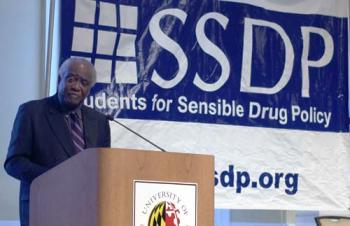
"This election was about change," said MPP's Houston. "It's a very exciting time, so why aren't we doing back flips?" he asked. Drug reform may get short shrift in an Obama administration faced with a free-falling economy and foreign crises, Houston answered himself. "We're walking into favorable conditions, but there are a lot of issues facing Obama and the Congress."
But the economic crisis could lead to opportunity, he said. "We have huge economic problems, and this could be the time to start talking about taxing and regulating marijuana. That could generate $10 to $14 billion a year for the federal treasury," he said.
"Change is going to happen," said Adam Wolf of the ACLU Drug Law Reform Project. Wolf ticked off an ACLU reform wish list of rescheduling marijuana, ending the government monopoly on growing marijuana for research purposes, ending the selective prosecution of medical marijuana patients and providers, abolishing the crack/powder sentencing disparity, and banning racial profiling.
"I'm hugely optimistic about the prospects for change in Congress," said Bill Piper, national affairs director for the Drug Policy Alliance (DPA), citing support for ending the federal funding ban on syringe exchange and reducing or eliminating the crack/powder sentencing disparity among highly placed Democrats. "We are over the hump," the Capitol Hill veteran said. "People are not afraid any more to talk about drug policy, and we have key committee chairs on our side. We will repeal the syringe ban and reduce sentencing disparities," he predicted.
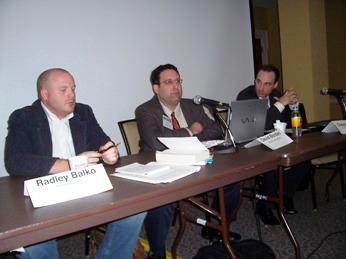
"Marijuana is more popular than the past three presidents," MPP executive director Rob Kampia told a cheering audience as he recounted this year's victories for medical marijuana in Michigan and decriminalization in Massachusetts.
Student activists took no back seat to the professionals, though, and the breadth of reform efforts by SSDP chapters, and number of campuses leading or helping with them was impressive. Conference-goers got to hear about campus campaigns ranging from establishing safe ride programs (reducing intoxicated driving without exposing students to threat of penalty); good Samaritan overdose policies (neither the student needing medical help nor the student reporting it facing threat of arrest); getting schools to stop calling police into dorms for drug infractions; reforming dorm eviction policies for substance violations; working with ballot initiative campaigns such as those in Michigan and Berkeley; public education efforts; and state lobbying campaign; among others.
One chapter, Kalamazoo College in Michigan, seemed to have done almost everything, and all during its first year. At the annual Awards Banquet, where representatives received the Outstanding Chapter Award, a raft of impressive achievements were listed off in the introduction. Not only did Kalamazoo SSDP get a safe ride program established, and Good Samaritan and not calling police into dorms for minor drug violation policies established. They also went outside the campus to bring together a coalition of community groups, government agencies and law enforcement to get approval for a needle exchange program in the city for the first time.
One highlight of the conference was the Saturday lunch debate between SSDP executive director Kris Krane and Kevin Sabet of Students Taking Action Not Drugs. The back and forth between the two, moderated by Washington Post columnist Courtland Milloy, kept the audience rapt -- and scoring the debate like a boxing match.
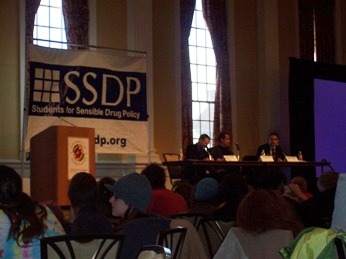
If Sabet was looking for agreement from Krane or the audience, he didn't find much of it. "Our metrics in the war on drugs are wrong," said Krane. "We should be measuring abuse, problem use, infection rates -- not drug use rates," he argued. "You have to get arrested to get treatment, and that's backwards," he said.
Instead of being based on the Holy Grail of reducing drug use, drug policy should have different guiding principles, Krane argued. "First, no one should be punished for using drugs absent harm to others. Second, we should adopt a harm reduction framework, and third, we should adopt a human rights framework."
"Drug use doesn't occur in a vacuum," Sabet retorted. "A lot of drug use is problematic, and some of that can be addressed by dealing with poverty, health care, and homelessness. There is common ground," he tried again.
Not so quick, Krane replied, arguing that drug use should be treated as a public health problem, not the purview of law enforcement.
"Drug trafficking is not a public health problem, it's a law enforcement problem," Sabet countered.
"Drug trafficking is a prohibition problem, not a law enforcement problem," Krane retorted to cheers from the crowd.
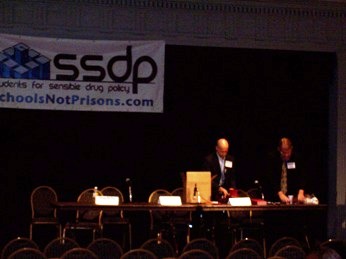
Davis, too, pronounced himself optimistic. "There is a sense of hope that we can develop a sane policy in the way we treat drugs," he told the students, "but you have to stay engaged and involved. You have to believe change is not only possible, it's inevitable."
If Saturday was a day of panelists and speechifying, Sunday was for getting down to nuts and bolts as the young activists attended a plethora of sessions hosted by more experienced veterans. Students heard presentations on best practices for chapter organizing, fundraising, making quick reform arguments, networking, working the media, and working with youth communities, and looking beyond campus reform, among others. And the lunch session was a working one, with activists dividing up geographically and deciding on locations for regional conferences to be held in the spring.
From its beginning with a handful of students in the Northeast in 1998 outraged by the Higher Education Act's drug provision, SSDP has grown to an international organization with 140 campus chapters in the US, as well as Canada, the United Kingdom and Nigeria. With all they learned at this year's conference, the newest generation of drug reform activists is now headed back home to spread the message and the movement to the next generation.
Visit the Drug WarRant blog for Pete Guither's seven-part series of live-written reports from the conference.
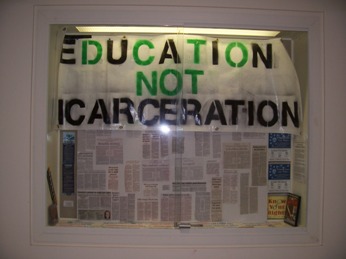
UMD SSDP window, Stamp Student Center
Comments
SSDP report
Excellent report on what must have been an excellent program.
I was hoping, but didn't read any, for comment on the idea that our drug war, especially against marijuana, as a government program for shipping jobs abroad.
Keep up the good work.
Gerald Sutliff
Drug war is a scam!
IF the Controlled Substances Act had any measurable, identifiable standards for harm and risk it would be a classic debate between advocates. I have a video about this at: http://www.youtube.com/watch?v=eYdrj1jjkw8 . Instead the policy is a scam using taxpayer dollars to promote a policy that has no basis in actual standards for harm and risk that empowers those who enforce the law to make the law. Those in our public education system and law enforcement will not allow knowledgeable critics of drug policy to speak at their taxpayer financed "drug awareness" assemblies or events. They know how easily this scam can be exposed!
The only debates on drug policy have been strictly limited to one between civil libertarians and public safety advocates. Of course, without standards, these "public safety advocates" are easily exposed as pro crime and pro disease. If you exhibit knowledge of the nature of this scam - drug policy advocates will run away screaming like little girls. Then when you point this out in letters to the editor they will whine about "personal attacks". Gotta love how sleazy these hucksters are; they would make the sleaziest snake oil salespeople blush green with envy!
Drug law enforcement is strictly a Darwinian proposition: only the weakest drug dealers [who double as serious addicts] are caught in the web of deceit used to prosecute this war. Those at the top of the dealer chain [often corporate leaders with a low moral compass] get off easily by turning in those they supply for immunity. It's all about impressive numbers to justify more theft of taxpayer monies. The irony is that no "respected" taxpayer organizations speak up too loudly about drug policy. Worse than that - even after being informed of the dishonest nature of policy - they refuse to speak up against this blatant scam.
Erin J says
Oh I wish I could have been there. Seems like it was a wonderful conference, the day for reform is in the air, I promise I feek it. It's time for Change in America, this is not flying by us anymore! Good job SSDP, especially Kris, nothing counters the lies and scams of the Drug War better than TRUTH!!!!
Add new comment